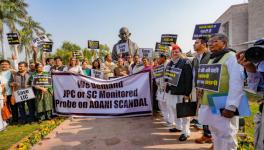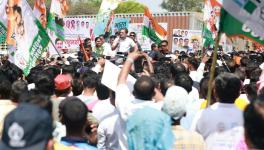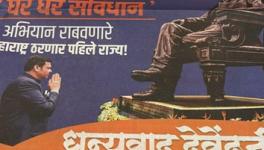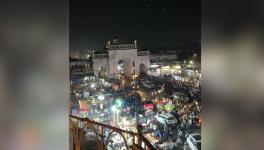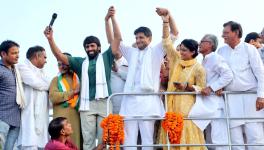Coming UP Elections: Advantage Mayawati
Uttar Pradesh is gearing up for what promises to be a closely contested election.
Chief Minister Mayawati is talking of further dividing the state into four parts, a proposal that has not found an echo as yet in the corridors of the Congress, BJP or for that matter the Samajwadi party. The Rashtriya Lok Dal has been campaigning for long for Harit Pradesh that basically is to be carved out of Western UP, a belt where Ajit Singh feels most comfortable in.
The BSP is fairly confident of retaining most of its Dalit vote, and some of the other backwards. The Congress and the BJP are in combat over the upper caste vote. The RJD is hopeful of retaining its Jat vote, while Mulayam Singh is confident of a consolidated Yadav vote. The Muslims thus become an important vote in UP, as always, with a couple of Muslim parties also in the fray. The Jamaat e Islami’s Welfare party plans to field 20 candidates in the Assembly polls here, while the Peace Party founded by a neurosurgeon of Gorakhpur Dr Ayub is confident of securing 100 seats with the smaller parties it has got into alliance with. The Congress is optimistic of getting a section of the Muslim vote with its secularism agenda, while the BSP is confident of retaining the poor and backward Muslim vote that it had received last time.
However, unlike the last Assembly polls the Samajwadi party seems to be getting back its lost constituency. The decision to part ways with former chief minister Kalyan Singh who had presided over the demolition of the Babri mosque has worked well for Mulayam Singh as has his recent statements on reservation for Muslims, and Justice in the Babri masjid demolition case. The Muslims in UP have started looking seriously again at the Samajwadi party, and while there mind is far from made up, it is back in the reckoning. More so as the BSP has lost ground here, with Mayawati being seen largely as anti-Muslim.
The Congress does not seem to have gained much ground despite the visits of party scion Rahul Gandhi. He lacks the charisma, says Dr Ayub, maintaining that his party will break its current alliance with the RJD if Ajit Singh enters into an understanding with the Congress. This is very much on the cards, but the talks have not moved beyond the initial agreement to talk. It is also not clear to Congress workers in western UP whether they will benefit from the alliance,
more so as past elections on this basis have shown that Ajit Singh is unable to transfer the Jat vote to the Congress.
Muslims in UP are clear about not providing the base vote for any party, having given up their loyalties some time ago when they shifted from the Congress to the Samajwadi party but Mulayam Singh failed to fulfil his promises of development and progress of the community at large. There was a point a few months ago when the Muslim voter started looking at the Congress again as a serious option. Fed up with the promises and rhetoric of the UP parties it was in a mood to go “national” and Rahul Gandhi’s targeted visits definitely generated some interest. However, the Congress’s inability to take up the minorities agenda convincingly at the national level, the mass arrests of youth in Congress ruled states for alleged terrorism, and insecurity intermixed with poor development, have made the Muslim voter cynical about the Congress in UP.
The Congress is also handicapped by the absence of an effective organization in UP, with the party being run by individuals at best. Rahul Gandhi who has not been drawing large crowds by UP standards, has the decided disadvantage of being from a party without an organization that can turn the goodwill into votes. On the other hand both the BSP and the Samajwadi party have strong organizations in UP, and in closely contested election as next years promises to be, the advantage goes to the organization. In fact, despite his poor performance politically Mulayam Singh has retained a big, secular organization that even in defeat ensures him respectable margins.
The political parties are presently trying to stitch up alliances, and consolidate basic votes. The Congress and BJP will tussle over the upper caste vote to quite an extent, but eventually all the non BJP parties will be caught in a fight for the substantial Muslim vote (nearly 16 per cent) in UP. The Peace Party that is appealing to the Muslim youth with a mantra of development is fielding a large number of non-Muslim candidates to attract voters from other segments of society. It is targeting the Pasi and Khatik votes, amongst others, in the broadly Dalit community as it feels that there is a level of disaffection with the BSP that it can cash into here.
The consensus at this point in time is interesting. One must hasten to point out that this can and will change as the weeks go by, but currently the consensus favours BSP as the single largest party, with a reduced majority in the first place; the Samajwadi party in the second; and the Congress and BJP vying for the third and fourth positions. But this is conjecture before the hurly burly of the campaign, and as pointed out it could be a different story altogether. The BJP remains confident of a “good performance” with its leaders refusing to give figures at this point in time. Samajwadi general secretary Mohan Singh was confident of victory but did not want to get into the numbers game. He was positive, however, that the Congress was back in the doldrums as the Rahul Gandhi card in UP had failed to work.
Uttar Pradesh will determine the national strategy of the political parties, particularly the BJP and the Congress, and is certainly a crucial poll that will influence the results of the 2014 general elections.
Image Courtesy: flickr.com
Get the latest reports & analysis with people's perspective on Protests, movements & deep analytical videos, discussions of the current affairs in your Telegram app. Subscribe to NewsClick's Telegram channel & get Real-Time updates on stories, as they get published on our website.










